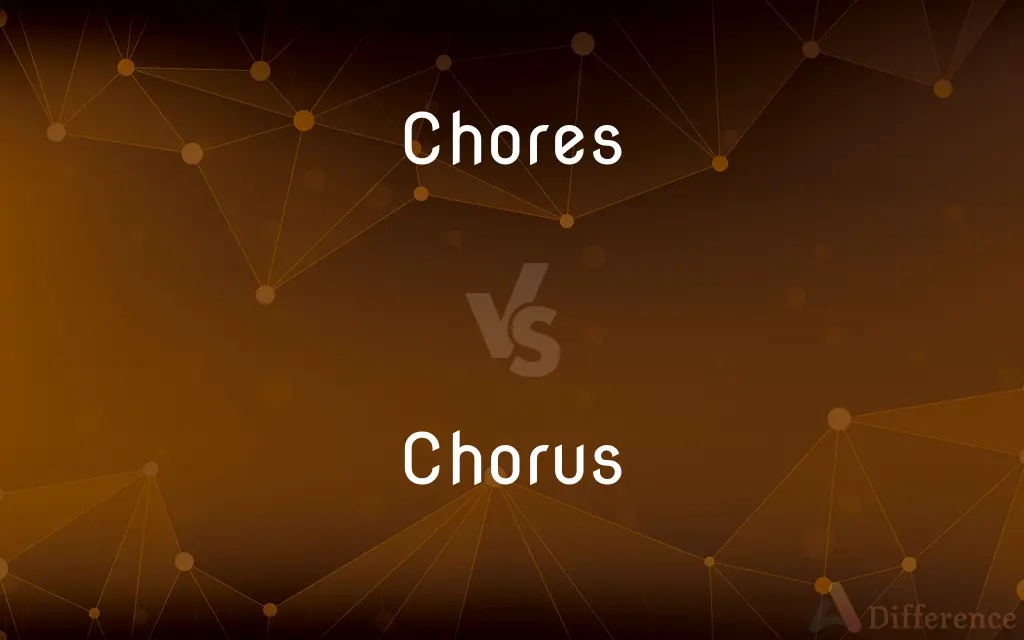Chores vs. Chorus — Which is Correct Spelling?
By Tayyaba Rehman — Updated on March 25, 2024
Chores is often mistakenly spelled as Chorus. Chorus refers to a group singing together or a repeated part of a song.

Table of Contents
Which is correct: Chores or Chorus
How to spell Chorus?

Chores
Incorrect Spelling

Chorus
Correct Spelling
ADVERTISEMENT
Key Differences
Context: Chores are done around the house; a Chorus is sung in a song or by a group.
Usage: Chores are daily responsibilities; a Chorus is a musical element.
Sound: Chores sounds like "chore" with an 's'; Chorus sounds like "core-us."
Structure: "Chore" with 's' is a task; "Chor" with 'us' is about music.
Purpose: Chores are tasks; a Chorus is a song's repeated section.
ADVERTISEMENT
How Do You Spell Chorus Correctly?
Incorrect: She joined the school chores because she loves to sing.
Correct: She joined the school chorus because she loves to sing.
Incorrect: The chores of the song is so catchy, I can't stop humming it.
Correct: The chorus of the song is so catchy, I can't stop humming it.
Chorus Definitions
A simultaneous utterance of something by many people.
The announcement was met with a chorus of cheers.
The section of a drama sung or spoken by the chorus.
The Greek play had a haunting chorus that explained the play's themes.
A feature in electronics to produce reverberant sound effects.
The guitarist used a chorus pedal to add depth to his tone.
A part of a song which is repeated after each verse
Strong guitar-driven songs with big, big choruses
A large organized group of singers, especially one which performs with an orchestra or opera company
He has words of praise for the RSNO Chorus
A simultaneous utterance of something by many people
‘Good morning,’ we replied in chorus
A growing chorus of complaint
(in ancient Greek tragedy) a group of performers who comment together on the main action
Sophocles no longer gave the chorus the major role
A device used with an amplified musical instrument to give the impression that more than one instrument is being played
A chorus pedal
(of a group of people) say the same thing at the same time
‘Morning, Sister,’ the nurses chorused
A group of singers who perform together, usually singing multi-part compositions with more than one singer for each part.
A group of vocalists and dancers who support the soloists and leading performers in operas, musical comedies, and revues.
A musical composition usually in four or more parts written for a large number of singers.
A refrain in a song, especially one in which the soloist is joined by other performers or audience members.
A solo section based on the main melody of a popular song and played by a member of the group.
A group of persons who speak or sing in unison a given part or composition in drama or poetry recitation.
An actor in Elizabethan drama who recites the prologue and epilogue to a play and sometimes comments on the action.
A group in a classical Greek drama whose songs and dances present an exposition of or, in later tradition, a disengaged commentary on the action.
The portion of a classical Greek drama consisting of choric dance and song.
A speech, song, or other utterance made in concert by many people.
A simultaneous utterance by a number of people
A chorus of jeers from the bystanders.
A simultaneous production of sound by numerous animals
The midday chorus of cicadas.
A simultaneous production of sound by numerous inanimate objects
A chorus of lawnmowers from the neighborhood's backyards.
To sing or utter in chorus.
A group of singers and dancers in a theatrical performance or religious festival who commented on the main performance in speech or song.
A song performed by the singers of such a group.
An actor who reads the prologue and epilogue of a play, and sometimes also acts as a commentator or narrator; also, a portion of a play read by this actor.
A group of singers performing together; a choir; specifically, such a group singing together in a musical, an opera, etc., as distinct from the soloists; an ensemble.
The performance of the chorus was awe-inspiring and exhilarating.
(by extension) A group of people in a performance who recite together.
An instance of singing by a group of people.
(figuratively)
A group of people or animals who make sounds together.
A chorus of crickets
A chorus of whiners
The noise or sound made by such a group.
A chorus of shouts and catcalls
(music)
A piece of music, especially one in a larger work such as an opera, written to be sung by a choir in parts (for example, by sopranos, altos, tenors, and basses).
A part of a song which is repeated between verses; a refrain.
The catchiest part of most songs is the chorus.
The main part of a pop song played after the introduction.
A group of organ pipes or organ stops intended to be played simultaneously; a compound stop; also, the sound made by such pipes or stops.
A feature or setting in electronic music that makes one instrument sound like many.
(Christianity) A simple, often repetitive, song intended to be sung in a group during informal worship.
(jazz) The improvised solo section in a small group performance.
(transitive)
To sing (a song), express (a sentiment), or recite or say (words) in chorus.
To express concurrence with (something said by another person); to echo.
(rare) To provide (a song) with a chorus or refrain.
(intransitive)
To sing the chorus or refrain of a song.
To sing, express, or say in, or as if in, unison.
To echo in unison another person's words.
Of animals: to make cries or sounds together.
A band of singers and dancers.
The Grecian tragedy was at first nothing but a chorus of singers.
A company of persons supposed to behold what passed in the acts of a tragedy, and to sing the sentiments which the events suggested in couplets or verses between the acts; also, that which was thus sung by the chorus.
What the lofty, grave tragedians taughtIn chorus or iambic.
An interpreter in a dumb show or play.
A company of singers singing in concert.
A composition of two or more parts, each of which is intended to be sung by a number of voices.
Parts of a song or hymn recurring at intervals, as at the end of stanzas; also, a company of singers who join with the singer or choir in singer or choir in singing such parts.
The simultaneous of a company in any noisy demonstration; as, a Chorus of shouts and catcalls.
To sing in chorus; to exclaim simultaneously.
Any utterance produced simultaneously by a group;
A chorus of boos
A group of people assembled to sing together
The part of a song where a soloist is joined by a group of singers
A body of dancers or singers who perform together
A company of actors who comment (by speaking or singing in unison) on the action in a classical Greek play
Utter in unison;
`yes,' the children chorused
Sing in a choir
A group of people singing together.
The school chorus performed at the annual function.
The part of a song that's repeated after each verse.
The chorus of the song was extremely catchy.
Chorus Meaning in a Sentence
A chorus of birds greeted the dawn with their songs.
His new song features a chorus that's easy to sing along with.
The song's chorus captured the mood of the generation.
The Greek play used a chorus to comment on the action.
The audience joined in the chorus, filling the hall with voices.
The chorus entered the stage to perform their final piece.
The chorus rehearses twice a week in preparation for the concert.
The chorus of the anthem is particularly moving and powerful.
Common Curiosities
What is the root word of Chorus?
The root word is the Greek "choros."
Which vowel is used before Chorus?
Typically, "a" as in "a chorus."
Why is it called Chorus?
It's derived from the Greek word "choros" meaning "dance or band of dancers and singers."
What is the verb form of Chorus?
There isn't a standard verb form; however, "chorusing" can be used to describe the act of singing in a chorus.
What is the pronunciation of Chorus?
It's pronounced as "KOR-us."
Which preposition is used with Chorus?
"Of" as in "chorus of birds."
What is the plural form of Chorus?
The plural form is "choruses."
Which article is used with Chorus?
"A" for singular and "the" if specifying a particular chorus.
Is Chorus a negative or positive word?
Neutral, but context can give it positive or negative connotations.
Which conjunction is used with Chorus?
Any conjunction can be used, depending on the sentence structure.
What is the singular form of Chorus?
The singular form is "chorus."
Is Chorus a noun or adjective?
Chorus is primarily a noun.
Is Chorus an adverb?
No, Chorus is not an adverb.
What is the first form of Chorus?
Chorus.
Is Chorus an abstract noun?
No, it's a concrete noun.
Is Chorus a countable noun?
Yes, you can have one chorus or multiple choruses.
Is the word Chorus is imperative?
No, Chorus is not imperative.
Is the word “Chorus” a Direct object or an Indirect object?
It can be either, depending on sentence structure.
How many syllables are in Chorus?
There are two syllables.
What is a stressed syllable in Chorus?
The first syllable "Chor" is stressed.
What is the opposite of Chorus?
Solo.
Which determiner is used with Chorus?
Determiners like "the," "a," or "an" can be used.
How do we divide Chorus into syllables?
Chor-us.
What is the third form of Chorus?
Again, Chorus is a noun and doesn't have verb forms.
How is Chorus used in a sentence?
The chorus of the song was memorable and had everyone humming along.
Is Chorus a vowel or consonant?
"Chorus" is a word composed of both vowels and consonants.
Is Chorus a collective noun?
Yes, when referring to a group of singers.
Is the Chorus term a metaphor?
Not inherently, but it can be used metaphorically.
What part of speech is Chorus?
It's a noun.
What is another term for Chorus?
Refrain.
Is the word Chorus is Gerund?
No, it's not a gerund.
What is the second form of Chorus?
Chorus doesn't have verb forms like first, second, or third.
Share Your Discovery

Previous Comparison
Imigrated vs. Immigrated
Next Comparison
Allso vs. AlsoAuthor Spotlight
Written by
Tayyaba RehmanTayyaba Rehman is a distinguished writer, currently serving as a primary contributor to askdifference.com. As a researcher in semantics and etymology, Tayyaba's passion for the complexity of languages and their distinctions has found a perfect home on the platform. Tayyaba delves into the intricacies of language, distinguishing between commonly confused words and phrases, thereby providing clarity for readers worldwide.














































